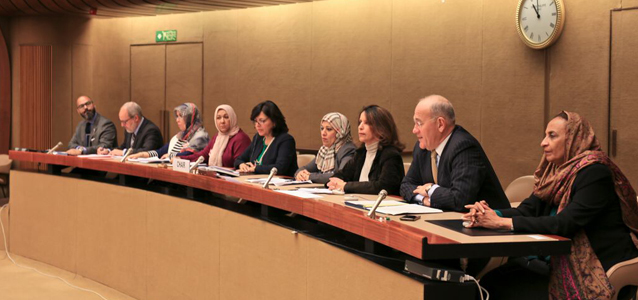Libyan women launch Libya’s first minimum peace agenda
Date:

A diversified and geographically representative group of Libyan women activists launched the first unified Libyan peace agenda on November 10 at the conclusion of a three-day conference in Switzerland organized by UN Women, the United Nations Support Mission for Libya (UNSMIL) and the Swiss Ministry of Foreign Affairs.
The group included former and current legislators, civil society and human rights activists, academics and independent politicians, from inside Libya as well as the diaspora communities. In spite of their significant differences, the 38 participants managed to reach a consensus over minimum requirements to bring peace to the charged Libyan atmosphere as well as to protect women’s rights during both the peace and the transitional processes.
“It is not acceptable for Libyan women to be excluded and for their roles to be marginalized and their wins to be ripped away even when they are the partners who bear the most damage in the ongoing conflict”, said the statement read by one of the participants at the launching press conference in the United Nations Office at Geneva.
The launch included a high level meeting with representative of the international community including several ambassadors as well as United Nations and European Union officials. A press conference followed when the participants presented the agenda to international media.
“The value of the unified agenda launched by the honorable participants today stems from their inspiring ability to overcome their political disagreements and the diversity of their opinions and of the movements they represent to give priority to the mutual interest and reach a consensus as a basis for sustainable peace in Libya”, said Mr. Mohammad Naciri, the Regional Director of UN Women for Arab States, during the high level meeting at the United Nations Office at Geneva.
The agenda focused on protecting women’s right to a 30% representation in government and elected body, enshrining gender equality in the new constitution and reforming laws to protect women’s right to live free from violence. The participants also agreed on the necessity of creating a women’s national machinery to advocate for women’s rights and work on solutions to their problems. Special focus was given to the issues of internally displaced women, women prisoners and women who were forced to become the sole breadwinners of their families due to the conflict without prior employment experience or economic prospects.
The document also tackled the minimum requirements to achieve peace for the entire society, not just women. These requirements included a balance between transitional justice, national reconciliation and the reintegration of fighters after disarmament. The participants reached a consensus that the traditional formation of the Libyan society could be used as an asset through utilizing a network of tribal and natural community leaders to push for peace and dissuade youth from taking part in the fighting.
“Our agreement today stresses our right to participate in the building of the future just like we were forced to bear the mistakes of the past and the threats of the present”, read the press statement presented by the participants at the press conference, “Today, we assert the right of women everywhere in weaving their future, and [stress] women’s ability to turn from conflict victims to peacemakers.”